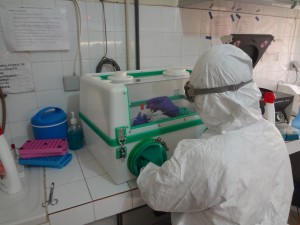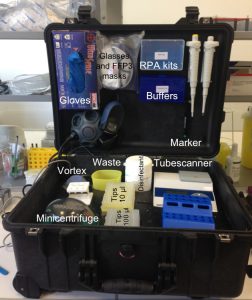Shaping the future: Our strategy for research and innovation in humanitarian response.

Shaping the future: Our strategy for research and innovation in humanitarian response.

A rapid, point-of-care diagnostic test for the Ebola virus will be trialled in the coming weeks at the Ebola treatment centre in Conakry, Guinea. The trial is one of six health research projects that have been jointly funded by the Wellcome Trust and the UK government.
The 15 minute Ebola test is six times faster than similar tests currently in use and aims to speed up the diagnosis of Ebola cases. Early detection of Ebola leads to better infection control as medical staff can identify and isolate confirmed cases of Ebola faster, and start treating patients sooner. Ultimately, a faster test could reduce Ebola transmission and mortality.

The project is supported through a joint Department for International Development (DFID) and Wellcome Trust fund for rapid health research during the Ebola outbreak. The six projects are managed by Enhancing Learning & Research for Humanitarian Assistance (ELRHA).
The trial, led by researchers at the Pasteur Institute in Dakar, Senegal, will be deployed using a ‘mobile suitcase laboratory’ which is designed for low-resource settings. The portable laboratory includes a solar panel, a power pack and a results reader which is the size of a small laptop.
The reagents used in the test are available as dried pellets, which are cold chain independent, meaning that they can be used and transported at room temperature. Similarly to the tests currently in use, the new test detects the genetic material of the virus. The pilot will test whether the reagents are safe and effective to use with Ebola patients’ blood and saliva samples.

Dr Val Snewin, International Activities Manager at the Wellcome Trust said: “A reliable, 15 minute test that can confirm cases of Ebola would be a key tool for effective management of the Ebola outbreak – allowing patients to be identified, isolated and cared for as soon as possible. It not only gives patients a better chance of survival, but it prevents transmission of the virus to other people.”
“This pilot study is particularly promising because researchers have considered how to make the test suitable for use in remote field hospitals, where resources – such as electricity and cold storage – are often in short supply.”
International Development Secretary Justine Greening said: “Britain’s first Ebola laboratory is already up and running in Sierra Leone and two more are currently being constructed. Together these will quadruple the number of tests that can be carried out every day and helping contain the spread of Ebola. The UK is doing everything possible to help the Government of Sierra Leone tackle and ultimately defeat Ebola. Funding this ground-breaking research will develop new ways of diagnosing suspected cases even more quickly and stop more people suffering from this deadly virus.”
Funding for these projects has been made available from an existing £6.5 million research initiative, Research for Health in Humanitarian Crises (R2HC), which is jointly funded by DFID and the Wellcome Trust. The five other funded projects, which have recently been announced, are:
University of Westminster – Dr Sterghios Moschos
This project looks at the development of a cost-effective, portable, battery-powered device which can provide reliable, rapid and safe diagnostic tests suitable for use in the field.
EbolaCheck aims to test bodily fluids for Ebola in a single process, providing results within 40 minutes – over eight times quicker than some existing laboratory techniques.
2. Predicting the geographic spread of Ebola virus disease in West Africa
University of Oxford – Professor Simon Hay & Dr Nick Golding
Using data on human mobility, population density and transport infrastructure in West African countries, this piece of research will make predictions about disease spread. This will enable resources to be deployed more effectively to contain the epidemic.
The information will be mapped out and contain summaries of health centres most likely to see new cases. This will be continuously updated as data becomes available and shared through an online tool.
3. Behaviour change to help infection prevention and control
International Rescue Committee – Dr Lara Ho
This research, being carried out in Sierra Leone, analyses the levels of knowledge and risks perceptions amongst health workers. The aim to help overcome barriers that staff may face in adhering to standard precautions. This will ensure that safety procedures and training for health workers is effective as possible to reduce the risk of infection while working on the front line.
4. Modelling the Ebola epidemic in West Africa
London School of Hygiene & Tropical Medicine – Professor John Edmunds
This piece of research uses statistical modelling to analyse data collected by MSF in West Africa to look at how many cases and deaths from Ebola might be expected over time. The study will look at what health care facilities will be needed to cope with different scenarios.
5. Ebola Response Anthropology Platform
London School of Hygiene & Tropical Medicine – Dr Melissa Parker
An Ebola Response Anthropology Platform will look at developing locally-appropriate interventions. The project aims to provide rapid, practical advice on how to engage more effectively with affected populations.
Image: Ebola virus. Credit: Public Health Image Library (PHIL), Centers for Disease Control and Prevention, USA
Jess Fisher (for inquiries in English)
Communications Manager
ELRHA
T 02920 803255
E [email protected]
Vanessa Dallet (for inquiries in French)
ELRHA
T 0203 763 1033
E [email protected]

 Please upgrade your browser
Please upgrade your browser
You are seeing this because you are using a browser that is not supported. The Elrha website is built using modern technology and standards. We recommend upgrading your browser with one of the following to properly view our website:
Windows MacPlease note that this is not an exhaustive list of browsers. We also do not intend to recommend a particular manufacturer's browser over another's; only to suggest upgrading to a browser version that is compliant with current standards to give you the best and most secure browsing experience.